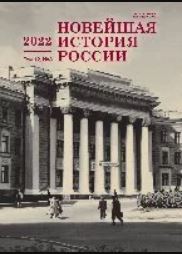Советский управленец Н.И.Иванов: трагедия хозяйственного руководителя 1920–1930-х гг.
Soviet Administrator N.I.Ivanov: Tragedy of the Economic Leader of the 1920s-1930s
Author(s): A. Yu. Davydov , E. A. KirillovaSubject(s): Economic history, Political history, Interwar Period (1920 - 1939), Politics and Identity
Published by: Издательство Исторического факультета СПбГУ
Keywords: Leningrad; NEP; Great Terror; executive committee; Petrograd; Leningrad; Soviet; public utilities; Lenmetallurgstroy; political campaigns; sabotage; Soviet identity;
Summary/Abstract: Using previously unpublished archival documents, this article provides one of the first studies on the biography of prominent Leningrad political and economic figure N.I.Ivanov. During War Communism and NEP he served as labor commissar for the Union of Communes of the Northern Region, headed the Department of municipal economy of the Executive Committee of the Petrograd/Leningrad Soviet, was was the second deputy chairman of the Еxecutive Сommittee of the Leningrad City Soviet. In the conditions of NEP he had to make compromises with businessmen and specialists from “former people”. In the “year of the great turning point”, he was fired from all posts and sent to work as a mechanic at a factory. During industrialization he was forgiven and became a director of the Lenmetallurgstroy plant. In 1937 Ivanov fell victim to the “Great Terror”, and was arrested and died. The article provides reasons for the repression of responsible Soviet business executives: it was found that effective administrators of the “ideologically vicious” NEP deviated from the strictly class line by necessity and were punished for this during Stalin’s “revolution form above”. At the same time, the factors of the deployment of massive repressive campaigns against factory directors influenced the processes of the formation of the socialist subjectivity of the builders of the new world. The article traces how in the 1930s, when propaganda extolled labor collectives as true creators of a perfect civilization, Ivanov had to deviate from the imperative principle of the collectivist worldview, and was forced to rely on the professional core of factory specialists, sometimes opposing himself to the bulk of the factory workers. This is the tragedy of the economic leader of Stalin’s time.
Journal: Новейшая история России
- Issue Year: 12/2022
- Issue No: 40
- Page Range: 672-686
- Page Count: 15
- Language: Russian

